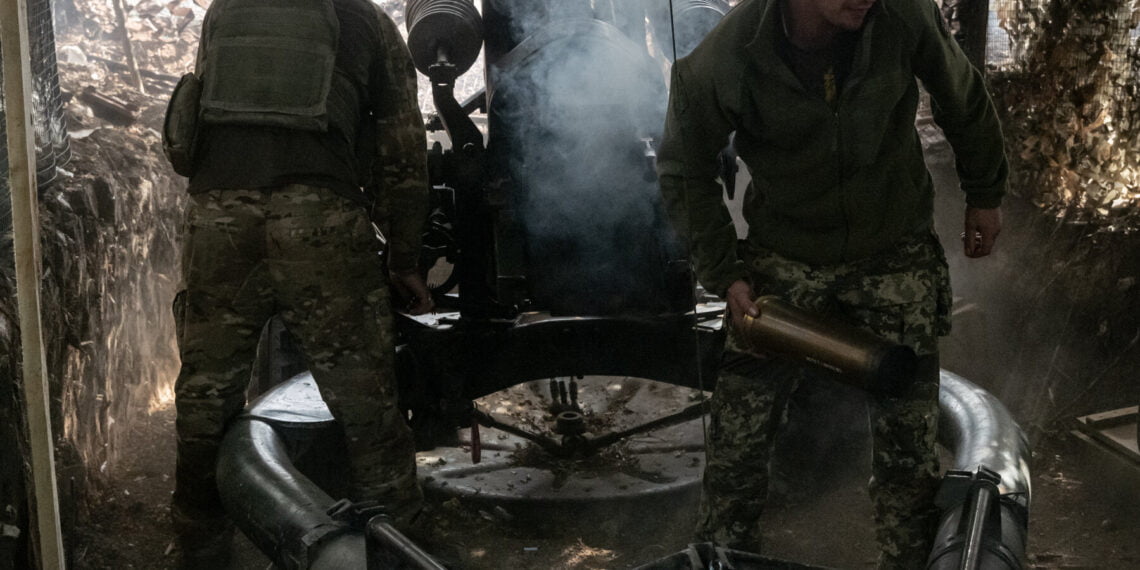The Gist:
The leaders of Ukraine and Denmark have called on allied nations to remove any restrictions on arms exports to Ukraine. They emphasised the need for increased production of weapons to support Ukraine in its ongoing conflict. Additionally, they highlighted the importance of establishing domestic production of arms within Ukraine itself. This appeal came during discussions aimed at strengthening global support for Ukraine as it confronts the challenges posed by the conflict.
Both leaders stressed that this move is crucial for enhancing Ukraine’s military capabilities and ensuring its security. By building weapons locally, Ukraine can become more self-sufficient and resilient in the face of ongoing threats. The leaders believe that lifting these restrictions will lead to a more robust international response to the situation, ultimately benefiting not only Ukraine but the stability of the entire region.
The Good:
- Increased Support for Ukraine: Lifting restrictions will provide Ukraine with much-needed military support, allowing it to defend itself more effectively.
- Boosting Local Economy: Building weapons inside Ukraine can create jobs and enhance the local economy. This local production can lead to technological advancements and improvements in skills.
- Strengthened Alliances: Increased arms support from allied nations can help strengthen relationships and cooperation among countries, promoting global unity in times of conflict.
- Deterring Aggression: By enhancing Ukraine’s military capabilities, it may act as a deterrent to potential aggressors, contributing to regional stability.
- Increased Security: Better armed forces can create a more secure environment for citizens, ensuring their safety and promoting peace in the region.
The Bad:
- Escalation of Conflict: Removing arms restrictions could lead to escalated violence and prolonged conflict, as more weapons circulate within the region.
- Risk of Misuse: There is a possibility that arms provided to Ukraine could be misused or fall into the wrong hands, potentially leading to unintended consequences.
- Strained Relations: Increased military support to Ukraine might worsen relations with nations that oppose such support, which could lead to geopolitical tensions.
- Dependence on Foreign Aid: Relying on external arms and support might hinder Ukraine’s own military development and self-sustainability.
- Humanitarian Concerns: The influx of weapons may exacerbate humanitarian crises, leading to increased suffering among civilians caught in the conflict.
The Take:
In a significant call for action, the leaders of Ukraine and Denmark have made a united plea for allied nations to reconsider the restrictions placed on arms exports to Ukraine. The ongoing conflict has left Ukraine in dire need of substantial military support to defend itself and ensure its sovereignty. During their discussions, they pointed out that many allied countries have been hesitant to provide adequate military resources due to various restrictions. This has been seen as a barrier to Ukraine effectively countering the challenges it faces.
Both leaders have stressed that it is essential for allies to increase their arms production capacity. This would allow for a more substantial support package for Ukraine, ensuring that it has the resources necessary to combat aggressors. Moreover, they highlighted an important strategy: aiding Ukraine in developing its own weapons production capabilities within its borders. This could provide Ukraine with the means to not only defend itself more effectively but also to foster domestic innovation and craftsmanship in military technology.
The implication of these calls is clear: Ukraine seeks to not only rely on external support but also to develop its own self-sufficiency in arms production. By urging allied countries to lift restrictions, they envisage a collaborative approach to rebuilding and strengthening Ukraine’s military. This could manifest in increased partnerships in defence technology and innovations that benefit both Ukraine and its allies.
However, the leaders are aware of the complexities involved in increasing arms production and lifting restrictions. They understand that while this could boost military efforts, it could also escalate tensions and violence. The leaders have proclaimed that this is a critical juncture for Ukraine, and the stakes are high.
As the situation unfolds, the need for military preparedness is becoming more apparent. Discussions regarding the production and provision of arms are not only about security but also about signalling to potential aggressors that the international community is unified in its support for Ukraine. The leaders of Ukraine and Denmark call for immediate action to enhance Ukraine’s defensive capabilities, reflecting a broader understanding of the challenges at hand.
Ultimately, the approach they advocate aims to create a more fortified and resilient Ukraine that can navigate the turbulent waters of international conflict. As allies consider their roles in supporting Ukraine, the call for lifting restrictions on arms and increasing production presents both opportunities and challenges that require careful consideration for the future peace and security of the region.
Click here to read the full article





































































